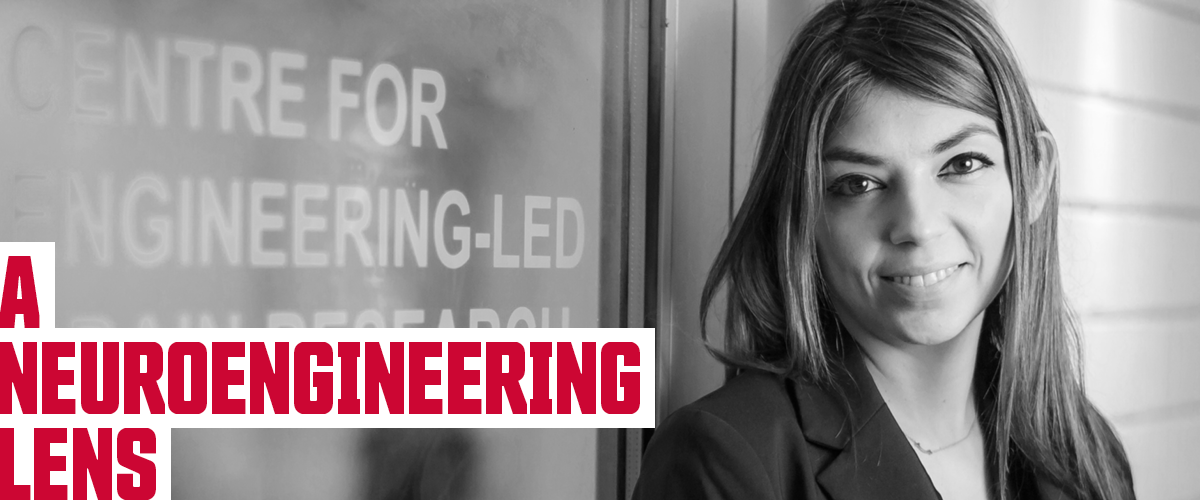
Dr. Faranak Farzan | A Neuroengineering Lens into Treatment of Youth Mental Health and Addiction
Health, 2020, PFL 2019-2020, President's Faculty Lectures
It is estimated that one in every five North American youths is affected by a mental illness. Surpassed only by injuries, mental illness in youth are ranked as the second highest hospital care expenditure in Canada. Unfortunately, current treatments are not as effective or cause side effects in a large minority, particularly in youth. Furthermore, across all age groups, treatment prescription is too often a trial-and-error process leading to years of untreated conditions, such as depression, before an effective therapy is identified. To tackle these challenges, in this talk, Dr. Farzan will describe how her team is combining engineering and neuroscience disciplines to study the human brain as a circuit. She will then review how by doing so, her team has begun developing novel diagnostic and treatment solutions for debilitating mental illnesses such as youth depression and addiction.
6:00 p.m. (PT)
SFU Sustainable Energy Building
10285 University Drive, Theatre, Room 1002
Surrey, BC
We respectfully acknowledge that this event takes place on the Unceded, Traditional, Ancestral Territories of the Sḵwx̱wú7mesh, Musqueam, Tsleil-Waututh, and Kwikwetlem, Kwantlen, Katzie, and Semiahmoo First Nations.
The President's Faculty Lectures
The President’s Faculty Lectures shine a light on the research excellence at Simon Fraser University. Hosted by the SFU president, these free public lectures celebrate cutting-edge research and faculty that engage with communities and mobilize knowledge to make real-world impacts.

Dr. Farzan is the Chair in Technology Innovations for Youth Addiction Recovery and Mental Health at the School of Mechatronic Systems Engineering at SFU. Dr. Farzan is the founder and Scientific Director of Centre for Engineering-Led Brain Research at SFU. She has obtained her Bachelor in Electrical and Biomedical Engineering from McMaster University, her Ph.D. in Biomedical Engineering and Medical Science from University of Toronto, and her Postdoctoral training in Cognitive Neurology from Harvard Medical School. Prior to joining SFU, she was Assistant Professor of Psychiatry at The University of Toronto, and Independent Scientist at the Centre for Addiction and Mental Health. Dr. Farzan leads a unique research program at the cross section of Engineering and Neuroscience. The program is aimed at development and practical implementation of neurotechnology and computational approaches for studying human brain health and function, and for diagnosis and treatment of neuropsychiatric disorders. Dr. Farzan has authored over 70 peer-reviewed journal articles, and her work has received funding from prestigious agencies such as CIHR, NSERC, CFI, CIHR, NIMH, NARSAD, Brain Canada, Kids Brain Health Network, and Michael Smith Foundation for Health Research.
Event Recording
-

Dr. Nathalie Sinclair | An Arithmetic Touch
Dr. Nathalie Sinclair, Canada Research Chair in Tangible Mathematics Learning, discusses her design of touchscreen technologies that could help make mathematical thinking and learning less abstract and more empowering for children and adults.
Read More →
-

Dr. Deanna Reder | The Obligations of Stories
Cree-Métis literary scholar Dr. Deanna Reder discusses the stories she was told about the 1967 unexplained disappearance of Métis leader Jim Brady and Cree councilor Abbie Halkett, and the responsibilities she holds because she listened.
Read More →
-

Dr. Faranak Farzan | A Neuroengineering Lens into Treatment of Youth Mental Health and Addiction
Dr. Faranak Farzan, Chair in Technology Innovations for Youth Addiction Recovery and Mental Health, shares how she and her team are combining neuroscience and engineering to develop novel diagnostic and treatment solutions for youth mental illnesses.
Read More →
-

Dr. Paul Budra | The Shakespeare Conspiracy
English professor Dr. Paul Budra explores the contrasts between the conspiracy theories rampant both in William Shakespeare's time and in our own era (including theories about Shakespeare himself), providing insight into our modern conspiratorial imagination.
Read More →
-
Tue, 12 Mar 2024
-
Tue, 13 Feb 2024
-
Tue, 23 Jan 2024
-
Wed, 29 Nov 2023
-
Wed, 27 Sep 2023
-
Tue, 22 Mar 2022
-
Wed, 02 Mar 2022
-
Wed, 02 Feb 2022
-
Tue, 25 Jan 2022
-
Tue, 23 Nov 2021
-
Tue, 28 Sep 2021
-
Tue, 01 Jun 2021
-
Tue, 11 May 2021
-
Wed, 07 Apr 2021
-
Tue, 09 Mar 2021
-
Tue, 09 Feb 2021
-
Tue, 19 Jan 2021
-
Tue, 10 Mar 2020
-
Tue, 25 Feb 2020
-
Thu, 06 Feb 2020
-
Tue, 26 Nov 2019
-
Thu, 14 Mar 2019
-
Thu, 21 Feb 2019
-
Wed, 21 Nov 2018
-
Thu, 11 Oct 2018



